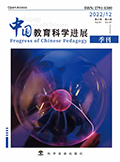

在当前智慧教育的大背景下, 元宇宙拓展了教育的边界, 更新了教育的形式, 精确了教育的结果, 也让教师变成了“学习者”。智慧教育给中小学教师带来了角色、能力与教学上的困扰, 存在适应不良的症候。遵循“适者生存”的原则, 中小学教师在智慧教育中应该主体确 认, 形成杠杆作用: 课程上, 中小学教师作为群体受力面, 要主动在虚拟与现实之间找到平衡, 充分利用数字资源, 掌握数字手段, 在专业技术上实现飞跃, 实现课程转型, 在教学上、教育上都要进入文化场域, 确认为智慧主体, 走向行动改善的正确路径。本研究着眼于中小学教师 的主体现状, 用思辨和实证相融合的方法, 聚焦中小学教师在智慧教育中的“技术眩晕”“技术迷恋”“技术排斥”与“技术迭代”, 旨在与数字达尔文时代同行, 让中小学教师走上技术解冻发展的路径, 遵循“适者生存”的原则, 从而顺应智慧教育的正确路径, 进行合目的、合规律的进化。
Under the current background of wisdom education, the meta-universe has expanded the boundary of education, updated the form. of education, refined the results of education, and made teachers become “learners”. Wisdom education has brought the role, ability and teaching problems to primary and secondary school teachers, and there are symptoms of maladaptation. In accordance with the principle of “Survival of the fittest”, primary and secondary school teachers in wisdom education should be recognized as the main body to form. a leverage role: We should take the initiative to find the balance between virtual and reality, make full use of digital resources, master digital means, make a leap in professional and technical skills to realize the transformation of curriculum, and enter the field of culture in teaching and education, the correct path of action improvement should be followed. This research focuses on the subject status of primary and secondary school teachers' subjects, using the method that combines discursive and empirical evidence to focus on primary and secondary school teachers' “Technology vertigo”, “Technology obsession”, “Technology exclusion” and “Technology iteration” in the context of wisdom education, aiming to keep pace with the Digital Darwin era, so that the primary and secondary school teachers can embark on the path of technology development and follow the principle of “Survival of the fittest”, so as to conform. to the correct path of wisdom education and carry out the evolution in accordance with the objectives and laws.